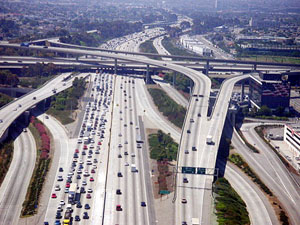California asks big diesel trucks to clean up exhaust by 2011
13 Dec 2008
San Francisco: California, a bellwether American state in matters related to pollution, on Friday became the first state in the country to compel big diesel trucks to clean up their exhaust. The ruling by the California Air Resources Board came despite warnings from truckers that the new rules would likely force them out of business.
The new rules, which will take effect in 2011, and will not require further ratification and impact about a million vehicles.
 The Air Resources Board declared that the health benefits resulting from the new regulations would far outweigh the financial pain, particularly in a state that has the dirtiest air in the nation.
The Air Resources Board declared that the health benefits resulting from the new regulations would far outweigh the financial pain, particularly in a state that has the dirtiest air in the nation.
"This is an industry that has an enormous impact on people's lives," chairman Mary Nichols said. "This regulation will save more than 9,000 lives and reduce the toxic emissions that cause cancer and birth defects."
Diesel trucks are held responsible for a third of the smog in California.
According to a California Air Resources Board estimate, though the regulations would cost about $5.5 billion, the health benefits of cleaner air would result in savings of $48 billion to $69 billion over the next couple of decades, primarily from decreased health costs.
The new rules, beginning 2011, would cover any trucks that travel through California without regard to their state of registration. Owners would be required to retrofit about 230,000 heavy duty rigs with diesel exhaust traps and replace about 350,000 older, dirty engines over the next 15 years.
By 2023, all trucks must meet 2010 new engine emission standards.
The move complements a detailed strategy to cut carbon emissions that the board passed on Thursday as part of its sweeping plan to cut carbon emissions to 1990 levels by 2020.
The Californian initiative is likely to receive federal support as president-elect Barack Obama has said that climate change will be a priority when he takes office in January.
Individual truckers and companies petitioned the board that the new rules requiring retrofitting of recently purchased trucks and the replacing of older vehicles would prove to be financially damaging during a global economic slowdown.
Though recognizing that a recessionary environment may yet impact the way the new rules are implemented chairman Mary Nichols said that history showed such rules were not economically burdensome.
"While this one is big and expensive and is being adopted in difficult times, we've never adopted a rule that I'm aware of that didn't have severe opposition," she said. "The reality has been that the cost of compliance has turned out to have been less than we estimated."


















